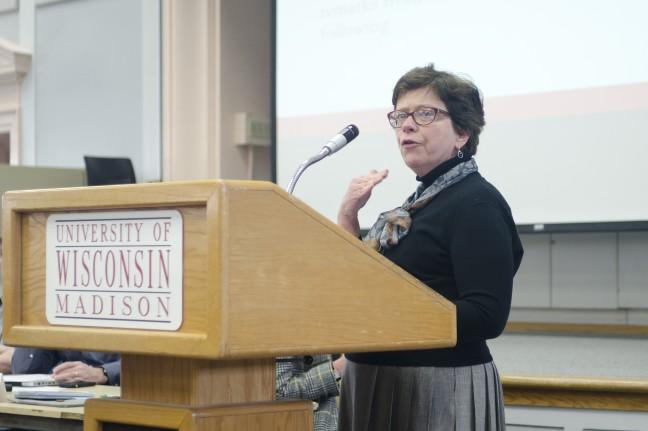Despite sharing concerns over a newly adopted University of Wisconsin System tenure policy, most faculty senators at UW haven’t made up their minds whether a recently-drafted non-confidence resolution toward system leadership is a good way to address the issue.
UW sociology professor and faculty senator Chad Goldberg, author of the resolution, finalized it April 25 to express non-confidence toward UW System President Ray Cross and the Board of Regents. He said the new policy, which allows school administration to shut down academic programs or lay off faculty members based on non-educational reasons, will erode academic due process and shared governance.
Chancellor Rebecca Blank strongly opposed the resolution through her latest blog post, saying she can’t see any positive outcome, only significant consequences.
“Such a vote would put the UW faculty in opposition to our governing board, with which we work closely and must have a positive relationship,” Blank said in the post. “UW makes requests of the Regents monthly, needing their approval of a host of activities.”
Public Representation Organization of the Faculty Senate, or PROFS, a voluntary organization started by the Faculty Senate, issued a statement Thursday morning regarding the resolution, which is up for a vote at the next Faculty Senate meeting May 2.
The statement does not take a committed stance, but instead talks about the importance for UW to retain top faculty as a flagship campus in the state and nation.
PROFS Legislative Representative Jack O’Meara said PROFS is not taking a definite position right now because as the public representation body of the Faculty Senate, its position will depend on the voting results at the Monday meeting.
“If they do adopt it, that will be our position,” O’Meara said. “We see them as our bosses.”
It is still hard to predict whether the senators will adopt the resolution, and PROFS is trying not to influence the vote in either direction, said Donald Moynihan, associate professor at the LaFollette School of Public Affairs and a member of the PROFS steering committee.
While some faculty members have deep concerns with the direction in which the system is going and feel the need to express them through the non-confidence resolution, Moynihan said, others think the bashing of system leadership through a resolution is one step too far.
Moynihan, however, said there is probably more agreement among faculty members on the resolution’s content: Concerns over disinvestment in higher education and attacks on tenure.
“Those are the wide set of concerns shared among most faculty … but I think the disagreement is whether it makes sense for faculty to call on the regents and the system president,” Moynihan said.
This disagreement is also Blank’s main concern because as chancellor, she needs to work with Cross and the Board of Regents on a constant basis, and if passed, it would make her job a lot harder, Percival Matthews, educational psychology assistant professor and District 30 faculty senator, said.
In this situation, Matthews said it’s Blank’s job to look out for the university’s best interests, be responsive to both faculty members and the demands of the regents. It’s not the chancellor’s role to be an agitator, he said, so it makes sense that she try voice her opposition to the resolution and find a middle ground, such as a milder way to express faculty dissatisfaction.
At a Faculty Senate executive committee meeting Monday, Blank said the “political backlash” to UW — if the resolution passes — will be very real, as reported by Wisconsin State Journal. Many university faculty feel pressured and even threatened by some of the state legislators who try to use their political power to intimidate the faculty for simply expressing an opinion, Goldberg said.
“A world-class university depends on the free exchange of ideas, and those ideas have to include the possibility of criticizing the administration and criticizing even the regents,” Goldberg said. “Because we feel that they’re taking actions that are not good for the university, that makes it harder for us to deliver quality product and services to the students and to the people of Wisconsin.”
To solve this problem, Matthews said there needs to be more engaged discussions between UW faculty and state legislators.
“I expect we will have a vigorous and spirited discussion and debate about the resolution, and I’m hopeful that the majority of senators will support the resolution, but we’ll just have to wait to see Monday,” Goldberg said.



















